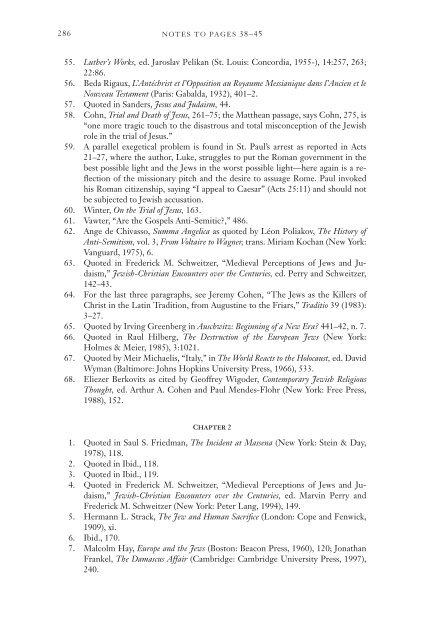Anti-semitism: Myth and Hate from Antiquity to the Present
Anti-semitism: Myth and Hate from Antiquity to the Present
Anti-semitism: Myth and Hate from Antiquity to the Present
Create successful ePaper yourself
Turn your PDF publications into a flip-book with our unique Google optimized e-Paper software.
286 NOTES TO PAGES 38–45<br />
55. Lu<strong>the</strong>r’s Works, ed. Jaroslav Pelikan (St. Louis: Concordia, 1955-), 14:257, 263;<br />
22:86.<br />
56. Beda Rigaux, L’Antéchrist et l’Opposition au Royaume Messianique dans l’Ancien et le<br />
Nouveau Testament (Paris: Gabalda, 1932), 401–2.<br />
57. Quoted in S<strong>and</strong>ers, Jesus <strong>and</strong> Judaism, 44.<br />
58. Cohn, Trial <strong>and</strong> Death of Jesus, 261–75; <strong>the</strong> Mat<strong>the</strong>an passage, says Cohn, 275, is<br />
“one more tragic <strong>to</strong>uch <strong>to</strong> <strong>the</strong> disastrous <strong>and</strong> <strong>to</strong>tal misconception of <strong>the</strong> Jewish<br />
role in <strong>the</strong> trial of Jesus.”<br />
59. A parallel exegetical problem is found in St. Paul’s arrest as reported in Acts<br />
21–27, where <strong>the</strong> author, Luke, struggles <strong>to</strong> put <strong>the</strong> Roman government in <strong>the</strong><br />
best possible light <strong>and</strong> <strong>the</strong> Jews in <strong>the</strong> worst possible light—here again is a reflection<br />
of <strong>the</strong> missionary pitch <strong>and</strong> <strong>the</strong> desire <strong>to</strong> assuage Rome. Paul invoked<br />
his Roman citizenship, saying “I appeal <strong>to</strong> Caesar” (Acts 25:11) <strong>and</strong> should not<br />
be subjected <strong>to</strong> Jewish accusation.<br />
60. Winter, On <strong>the</strong> Trial of Jesus, 163.<br />
61. Vawter, “Are <strong>the</strong> Gospels <strong>Anti</strong>-Semitic?,” 486.<br />
62. Ange de Chivasso, Summa Angelica as quoted by Léon Poliakov, The His<strong>to</strong>ry of<br />
<strong>Anti</strong>-Semitism, vol. 3, From Voltaire <strong>to</strong> Wagner, trans. Miriam Kochan (New York:<br />
Vanguard, 1975), 6.<br />
63. Quoted in Frederick M. Schweitzer, “Medieval Perceptions of Jews <strong>and</strong> Judaism,”<br />
Jewish-Christian Encounters over <strong>the</strong> Centuries, ed. Perry <strong>and</strong> Schweitzer,<br />
142–43.<br />
64. For <strong>the</strong> last three paragraphs, see Jeremy Cohen, “The Jews as <strong>the</strong> Killers of<br />
Christ in <strong>the</strong> Latin Tradition, <strong>from</strong> Augustine <strong>to</strong> <strong>the</strong> Friars,” Traditio 39 (1983):<br />
3–27.<br />
65. Quoted by Irving Greenberg in Auschwitz: Beginning of a New Era? 441–42, n. 7.<br />
66. Quoted in Raul Hilberg, The Destruction of <strong>the</strong> European Jews (New York:<br />
Holmes & Meier, 1985), 3:1021.<br />
67. Quoted by Meir Michaelis, “Italy,” in The World Reacts <strong>to</strong> <strong>the</strong> Holocaust, ed. David<br />
Wyman (Baltimore: Johns Hopkins University Press, 1966), 533.<br />
68. Eliezer Berkovits as cited by Geoffrey Wigoder, Contemporary Jewish Religious<br />
Thought, ed. Arthur A. Cohen <strong>and</strong> Paul Mendes-Flohr (New York: Free Press,<br />
1988), 152.<br />
CHAPTER 2<br />
1. Quoted in Saul S. Friedman, The Incident at Massena (New York: Stein & Day,<br />
1978), 118.<br />
2. Quoted in Ibid., 118.<br />
3. Quoted in Ibid., 119.<br />
4. Quoted in Frederick M. Schweitzer, “Medieval Perceptions of Jews <strong>and</strong> Judaism,”<br />
Jewish-Christian Encounters over <strong>the</strong> Centuries, ed. Marvin Perry <strong>and</strong><br />
Frederick M. Schweitzer (New York: Peter Lang, 1994), 149.<br />
5. Hermann L. Strack, The Jew <strong>and</strong> Human Sacrifice (London: Cope <strong>and</strong> Fenwick,<br />
1909), xi.<br />
6. Ibid., 170.<br />
7. Malcolm Hay, Europe <strong>and</strong> <strong>the</strong> Jews (Bos<strong>to</strong>n: Beacon Press, 1960), 120; Jonathan<br />
Frankel, The Damascus Affair (Cambridge: Cambridge University Press, 1997),<br />
240.
















